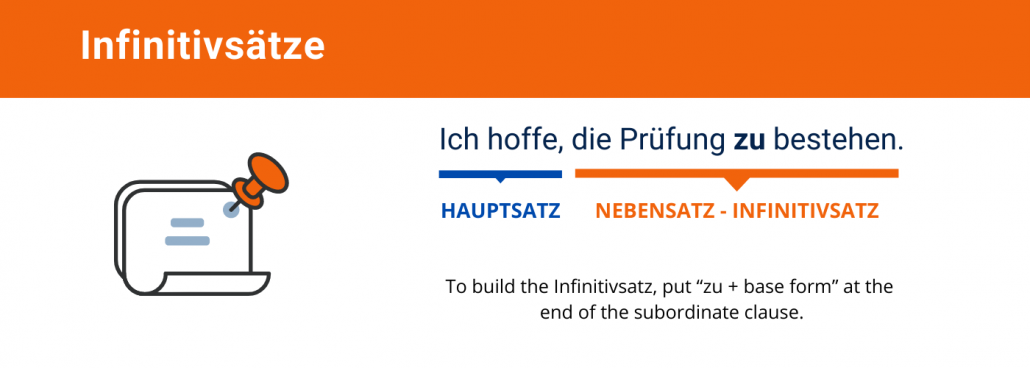Infinitivsätze – how to build infinitive clauses in German
To “zu” or not to “zu”? That is the question – An explanation of German infinitive clauses (Infinitivsätze)
A lot of German learners have some trouble using the infinitive when they build sentences. Either they put “zu” where it is not needed, or they forget to put it in a sentence where it is necessary. We hope this article will help you get a clear picture of Infinitivsätze.
But what does Infinitivsatz mean? The word “Infinitiv”, which is similar to the English word “infinitive”, indicates the base form of a verb. Sagen, schreiben, kommen, gehen… these are all infinitives.
“Satz” means sentence and “Sätze” is its plural form. So basically, we are talking about sentences built with the infinitive. However, not all sentences wich include a verb in its base form are called “Infinitivsätze”. We use this term to refer to those sentences where the infinitive is built with “zu”.
Ich habe vor, meinen Freund zu besuchen. – I am planning to visit my friend.
Ich versuche, einen Job zu finden. – I am trying to find a job.
How do we build Infinitivsätze?
An Infinitivsatz is a subordinate clause (Nebensatz). This means that it is always linked to a main clause (Hauptsatz). We usually use a comma to separate the main clause from the subordinate clause.
Ich hoffe, die Prüfung zu bestehen. – I hope I pass the exam.

When it comes to the Infinitivsatz, you have to put “zu + base form” at the end of the sentence. If the verb is separable, “zu” is put between the prefix and the verb.
Ich verspreche, mein Zimmer aufzuräumen. – I promise to tidy up my room.
Ich habe vor, heute Abend auszugehen. – I’m going out this evening./ I’m planning to go out this evening.
Please remember that the Infinitivsatz has no subject. In fact, it generally refers to the subject or object expressed in the main clause.
Ich hoffe, mich morgen besser zu fühlen. – I hope I will feel better tomorrow.
Meine Mutter erlaubt mir, meinen Freund zu treffen. – My mother allows me to meet my friend.
Es ist wichtig, Zeit für sich selbst zu finden. – It is important to find time for yourself.
For this reason, it is not possible to use an Infinitivsatz with “zu” if the subject of the subordinate clause is different from the subject/object of the main clause. In this case, we must build the subordinate sentence with “dass”.
Ich hoffe, dass er sich besser fühlt. – I hope he feels better.
Ich hoffe, sich besser zu fühlen – NOT CORRECT
When to use Infinitivsätze – a few examples
Some verbs are often followed by an infinitive clause. Here we list the some key ones:
vorhaben (to plan): Ich habe vor, heute einkaufen zu gehen. – I’m planning to do the shopping today.
versuchen (to try): Ich versuche, mehr Gemüse zu essen. – I’m trying to eat more vegetables.
vorschlagen (to suggest): Ich schlage vor, Chinesisch zu essen. – I suggest eating Chinese food.
versprechen (to promise): Ich verspreche, pünktlich zu sein. – I promise I will be on time.
beginnen und anfangen (to begin): Er fängt an, sich besser zu fühlen. – He’s starting to feel better.
hoffen (to hope): Ich hoffe, Schauspielerin zu werden. – I hope to become an actress.
glauben (to believe): Sie glaubt, fertig für die Prüfung zu sein. – She thinks she’s ready fort he test.
In addition, one can find an infinitive clause after these kinds of constructions:
adjective/past participle + sein
Gut sein (to be good): Es ist gut, oft Sport zu machen. – It is good to exercise often.
Wichtig sein (to be important): Es ist wichtig, oft Sport zu machen. – It is important to exercise often.
Bereit sein (to be ready): Er ist bereit, zu heiraten. – He is ready get married.
Erlaubt/verboten sein (to be allowed/forbidden): Es ist verboten, im Park zu grillen. – It is forbidden to have a barbecue in the park.
Richtig/falsch sein (to be right/wrong): Es ist richtig, den Müll zu trennen. – It is right to separate waste.
Leicht sein (to be easy): Es ist leicht, etwas online zu bestellen. – It is easy to order something online.
noun + haben
Lust haben (to feel like): Peter hat Lust, Gitarre zu spielen. – Peter feels like playing the guitar.
Zeit haben (to have time): Wir haben Zeit, eine Tasse zu trinken. – We have time to drink a cup of tea.
Angst haben (to be afraid): Ich habe Angst, krank zu sein. – I am afraid to be sick.
Infinitivsätze with “um…zu”
Now let us have a look at a particular type of Infinitivsatz, namely the one built with “um…zu”. This structure is used to express the aim of the action. Just like in the normal infinitive clause, we use “zu + base form” at the end of the subordinate clause. In addition to that, we should put “um” right after the comma that separates the main clause from the subordinate clause.
Ich studiere Medizin, um Arzt zu werden. – I study medicine to become a doctor.
Ich brauche Wasser, um meine Pflanzen zu gießen. – I need water to water my plants.
Do not use ZU in these cases
There are other cases where we use the infinitive in a sentence. The most common one is with modal verbs:
Ich möchte eine neue Tasche kaufen. – I would like to buy a new bag.
Modal verbs are followed by the base form of the verb, but we do not have to use “zu”.
The infinitive is also to be found after verbs like “bleiben”, “lassen”, “gehen”, “fahren”, “sehen” and “hören”.
Here are a few examples:
Nach der Operation bleibt sie liegen. – She stays in bed after the surgery.
Er geht jeden Tag spazieren. – He goes for a walk every day.
Ich sehe ein Baby weinen – I see a baby crying
Ich höre meine Nachbarin singen. – I hear my neighbour singing.
It would be wrong to use “zu” in these kinds of sentence.
Ich möchte eine neue Tasche zu kaufen – NOT CORRECT
A simple exercise to practice
Try to write at least three sentences about your hopes for the future (in the short or long term). Use the Infinitivsätze with “zu”, just like in the examples below.
Ich hoffe, Rechtsanwalt zu werden. – I hope to become a lawyer.
Ich hoffe, dich wieder zu sehen. – I hope I see you again.
Looking for a German course?
Berlino Schule is the right place for you! We offer German courses from A1 to C1. Our teachers are certified and have years of experience in the teaching field. Take a look at the calendar to see when the new courses are starting.
Our contacts
Gryphiusstraße 23, 10245 Berlin-Friedrichshain
+49 030 36465765
info@berlinoschule.com
Facebook page
Instagram profile




Thanks. Super clear and useful. ? you change my life today jaja.